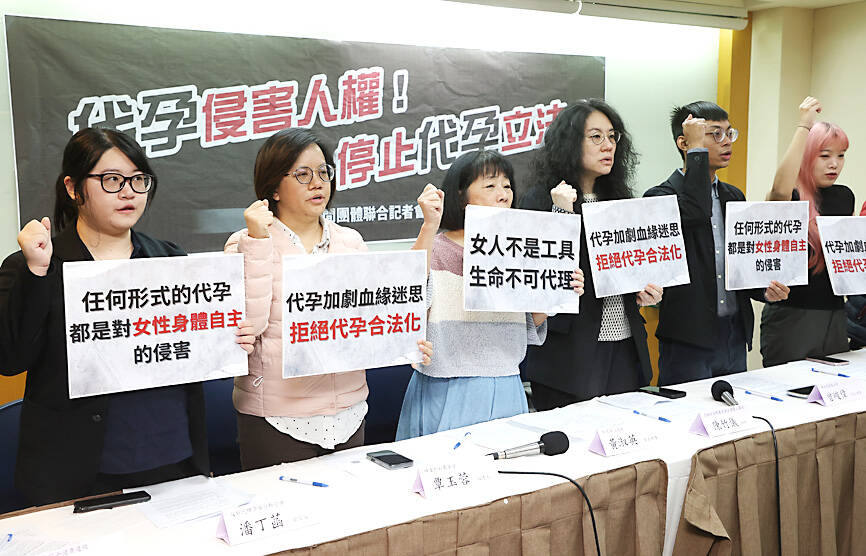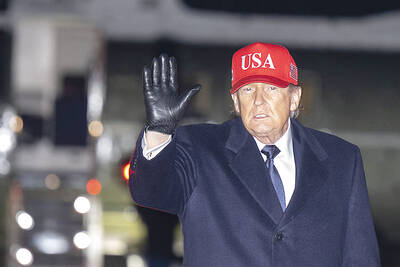The Ministry of Health and Welfare said it has decided to separate the issue of surrogacy from its proposed package of amendments to the Assisted Reproduction Act (人工生殖法).
The ministry’s draft amendments were first announced on May 14, with the ministry aiming to broaden access to artificial insemination for single women, same-sex couples and surrogate mothers.
The amendments were to be submitted to the Legislative Yuan for review this month, but the ministry changed its position after women’s groups and lawmakers opposed the proposed “surrogate mother system.”

Photo: CNA
Surrogacy is illegal in Taiwan, but concerns about the nation’s falling fertility rate and declining population have shifted public opinion toward allowing couples to use surrogate mothers.
On Monday morning, eight Democratic Progressive Party (DPP) lawmakers called for the issue of surrogacy to be addressed separately from the Assisted Reproduction Act, and the ministry later that day announced it would first deal with the draft amendments in which a consensus has been achieved — including broadening eligibility for assisted reproduction to lesbians and single women — while addressing the more contentious issue of surrogacy separately.
“Civil society groups and the public have continued to express their opposition to surrogacy,” Health Promotion Administration Director-General Wu Chao-chun (吳昭軍) said.
A survey found that “about 80 percent” of more than 600 comments received by the ministry concerning potential changes to the law expressed opposition to surrogacy, Wu said.
“It is difficult to weigh the rights and interests of various stakeholders involved in the surrogacy process,” he said, referring to surrogate children, surrogate mothers and those seeking surrogate births.
Given the change in direction on surrogacy, the ministry will revise its package of amendments and submit it for approval to the Executive Yuan by the end of the year before sending it to the Legislative Yuan for review.
Before then, the legislature’s Social Welfare and Environmental Hygiene Committee is scheduled to review tomorrow 16 amendments proposed by various political parties.
A coalition of women’s rights groups — including the League of Taiwan Women — yesterday said that surrogacy is harmful to human rights, urging lawmakers to oppose its legalization.
The coalition added that it would hold protests tomorrow when the legislative committees begin reviewing the bill.
Taiwan Anti-Surrogate Pregnancy Action Group spokeswoman Chen Kai-ning (陳愷寧) said the nation should not commodify women’s wombs for the sake of procreation or boosting birthrates.
Women’s bodies are not reproductive tools and infants are not merchandise, she said.
Separately yesterday, Chinese Nationalist Party (KMT) Legislator Chen Ching-hui (陳菁徽), who is also a fertility specialist, panned the ministry for dropping surrogacy from the proposed amendments to the act, saying the decision politicized a livelihood issue.
The bill had formerly enjoyed support from across the political divide for its potential to improve the lives of LGBTQ people, single women and women with womb disorders, she said, adding that lawmakers need to discuss the matter.
President William Lai (賴清德), Vice President Hsiao Bi-khim (蕭美琴) and Kaohsiung Mayor Chen Chih-mai (陳其邁) 22 years ago cosponsored the first-ever bill to legalize surrogacy when they were lawmakers, she said.
The DPP caucus similarly supported a version of the act’s amendments that included legalizing surrogacy legalization in the previous legislative session, only to turn against it the day before, Chen said.
Criticism that surrogate pregnancy would commodify the womb stems from ideological and political manipulations that contravene the opinions of experts and medical professionals consulted in the law’s writing, she said.
Taiwanese women are having children at an increasingly older age, resulting in higher risks of complications that affect fertility, Chen Ching-hui said, adding that surrogacy could be an option for those who want, but cannot have children.
The nation that promulgated marriage equality in 2016 should do more to guarantee LGBTQ couples also enjoy the right to have children, she said.

Taiwan has received more than US$70 million in royalties as of the end of last year from developing the F-16V jet as countries worldwide purchase or upgrade to this popular model, government and military officials said on Saturday. Taiwan funded the development of the F-16V jet and ended up the sole investor as other countries withdrew from the program. Now the F-16V is increasingly popular and countries must pay Taiwan a percentage in royalties when they purchase new F-16V aircraft or upgrade older F-16 models. The next five years are expected to be the peak for these royalties, with Taiwan potentially earning

STAY IN YOUR LANE: As the US and Israel attack Iran, the ministry has warned China not to overstep by including Taiwanese citizens in its evacuation orders The Ministry of Foreign Affairs (MOFA) yesterday rebuked a statement by China’s embassy in Israel that it would evacuate Taiwanese holders of Chinese travel documents from Israel amid the latter’s escalating conflict with Iran. Tensions have risen across the Middle East in the wake of US and Israeli airstrikes on Iran beginning Saturday. China subsequently issued an evacuation notice for its citizens. In a news release, the Chinese embassy in Israel said holders of “Taiwan compatriot permits (台胞證)” issued to Taiwanese nationals by Chinese authorities for travel to China — could register for evacuation to Egypt. In Taipei, the ministry yesterday said Taiwan

‘LIKE-MINDED PARTNER’: Tako van Popta said it would be inappropriate to delay signing the deal with Taiwan because of China, adding he would promote the issue Canadian senators have stressed Taiwan’s importance for international trade and expressed enthusiasm for ensuring the Taiwan-Canada trade cooperation framework agreement is implemented this year. Representative to Canada Harry Tseng (曾厚仁) in an interview with the Central News Agency (CNA) said he was increasingly uneasy about Ottawa’s delays in signing the agreement, especially as Ottawa has warmed toward Beijing. There are “no negotiations left. Not only [is it] initialed, we have three versions of the text ready: English, French and Mandarin,” Tseng said. “That tells you how close we are to the final signature.” Tseng said that he hoped Canadian Prime Minister Mark Carney

The US’ joint strikes with Israel on Iran dismantled a key pillar of China’s regional strategy, removing an important piece in Beijing’s potential Taiwan Strait scenario, said Zineb Riboua, a senior researcher at the Hudson Institute’s Center for Middle East Peace and Security. In an article titled: “The Iran Question Is All About China,” Riboua said that understanding the Iran issue in the context of China’s “grand strategy” is essential to fully grasp the complexity of the situation. Beijing has spent billions of dollars over the years turning Iran into a “structural strategic asset,” diverting US military resources in the